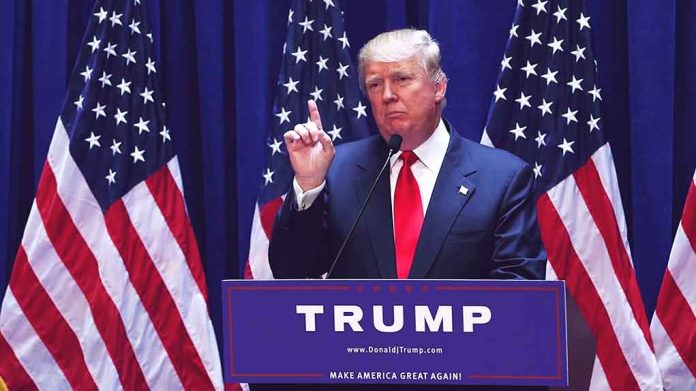
President Trump nominates Vice Admiral Brad Cooper to lead US Central Command, making history as the first Navy Admiral to head the vital Middle East command since its creation in 1983.
Key Takeaways
- Vice Adm. Brad Cooper, currently CENTCOM’s deputy commander, will be the first Navy admiral to lead the command in its 40-year history
- Cooper has extensive combat experience, overseeing 100 strikes against Houthi militants and deploying innovative military technologies including AI and uncrewed vessels
- The appointment aligns with President Trump’s strategic vision to restore stability in the Middle East amid ongoing conflicts
- Air Force Lt. Gen. Dagvin Anderson has been nominated to lead US Africa Command, becoming the first Air Force officer in that role
- Both nominees would receive their fourth star upon Senate confirmation
Historic Leadership Change for Critical Middle East Command
President Donald Trump has made a significant leadership change in America’s military command structure, nominating Vice Admiral Charles “Brad” Cooper II to become the next chief of U.S. Central Command (CENTCOM). This nomination represents a historic shift as Cooper would become the first Navy admiral to lead CENTCOM since its formation in 1983. The command oversees U.S. military operations across the Middle East and Central Asia, making it one of the most strategically important positions in the American defense structure. Cooper, who currently serves as CENTCOM’s deputy commander, brings extensive experience as a surface warfare officer and former commander of U.S. 5th Fleet and U.S. Naval Forces Central Command.
“Vice Adm. Charles “Brad” Cooper II was nominated to lead CENTCOM, which oversees U.S. forces and operations across the Middle East and central Asia, according to a Pentagon.”
Combat Experience and Technological Innovation
Cooper has distinguished himself through his active role in operations against Houthi insurgents in Yemen, overseeing approximately 100 strikes targeting their drone and missile capabilities. His leadership has been marked by the innovative integration of advanced technologies into military operations, including artificial intelligence, armed drones, and uncrewed vessels. These technological advancements have proven crucial in addressing the complex security challenges in the region. Beyond combat operations, Cooper has demonstrated commitment to humanitarian efforts, notably supervising the construction of a humanitarian pier off Gaza’s coast, providing an essential lifeline for aid delivery during ongoing conflicts.
Aligned with Trump’s Strategic Vision
Cooper’s appointment reflects President Trump’s commitment to addressing persistent instability in the Middle East. If confirmed by the Senate, Cooper will replace General Michael “Erik” Kurilla, who is expected to retire after a successful tenure that included coordinating the defense of Israel against Iranian attacks. The Middle East remains a focal point of Trump’s foreign policy, with the President emphasizing his determination to restore peace and stability to the region amid ongoing conflicts in Gaza and uncertainties surrounding nuclear negotiations with Iran. Trump has expressed optimism about the prospects for a ceasefire in Gaza and potential for finding common ground with Iran.
“quickly restore stability in the Middle East,” Said President Donald Trump.
The President has consistently articulated his vision to “return the world to peace,” reflecting his administration’s foreign policy priorities. Trump’s pragmatic approach to international relations is evident in his assessment of potential diplomatic breakthroughs, including with traditionally adversarial nations like Iran, remarking plainly that “They don’t want to be blown up,” highlighting his belief in deterrence as a pathway to peace. This appointment represents a key element in implementing that vision across one of the world’s most volatile regions.
Additional Leadership Changes
Alongside Cooper’s nomination, President Trump has also nominated Air Force Lt. Gen. Dagvin Anderson to lead U.S. Africa Command (AFRICOM). Anderson, currently serving as the director of Joint Force Development (J-7), would become the first Air Force officer to head AFRICOM if confirmed. His background includes command of several special operations units and extensive experience with KC-135 Stratotanker jets. Additionally, Vice Adm. Frank Bradley has been nominated to become the chief of U.S. Special Operations Command (SOCOM). These appointments collectively signal Trump’s comprehensive approach to addressing security challenges across multiple theaters of operation.
Both Cooper and Anderson would receive their fourth star upon Senate confirmation, elevating them to the rank of full admiral and general, respectively. These nominations reflect President Trump’s commitment to placing experienced military leaders in critical positions as his administration works to address multiple ongoing conflicts and security challenges around the globe. The appointments signal a strategic emphasis on both technological innovation and proven battlefield leadership as essential elements of America’s military doctrine moving forward.




